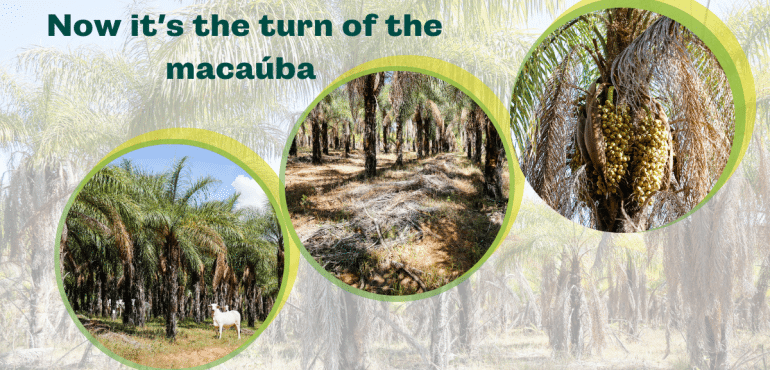Brazil already has the technology for large scale production of macaúba, which, as well as being a source of both food and energy, provides ecosystemic services. The search for new oleaginous sources to increase the supply of oil on the domestic and global markets was the focus of the National Biodiesel Production and Use Program (PNPB) launched in 2004. This scenario stimulated the academic world, which started to direct studies towards the search for new raw materials. “In 2007 I joined a group headed by professor Sérgio Motoike, at the Federal University of Viçosas (UFV), and we started researching the macaúba [a native Brazilian tree], since it showed characteristics similar to the world’s leading oil plant, the palm tree,” says Leonardo Pimentel, professor and researcher at UFV.
Fourteen years passed, and what had been just an initial study has matured and gained in importance. “This is just the right time for this production chain to scale up in the Brazilian and global contexts. We have a technological base and a learning curve in the domestication of this plant. Furthermore, there are a number of companies developing the production chain on a reasonable scale, which will provide the investor with credibility in the production of plant oil that can be used at bioindustries,” explains Pimentel.
However, according to the researcher, what weighs in favor of the macaúba most is the fact that it is able to respond to the current pressures of the world market. “The global demand is for concrete solutions for the sustainable provision of food and energy along with the supply of environmental services,” explains the professor. The macaúba meets all the requirements of the current economic situation involving a transition to a low carbon economy. Listed below are some of the advantages:
TOUGHNESS: The macaúba tree is a species widely found in the Cerrado biome, requiring very little in terms of hydro-resources. Whilst the palm tree only grows in tropical forest regions with a minimum of 2,000mm of rain, well distributed over the course of the year, the macaúba is found in regions with extended periods of drought with just 1,200mm of rain each year.
Characteristics of Macaúba
ADAPTABLE TO FRAGILE SOILS: Due to the toughness of the species, the macaúba can be cultivated in regions where the grasslands have been damaged and are largely infertile. As such, the expansion of the cultivation will take place in areas lying outside conventional agriculture, locations in which other crops fail to survive. “This will be an addition to the sector rather than a competitor,” explains Pimentel.
MITIGATION OF CLIMATE CHANGES: In addition to requiring less water, the macaúba is planted in integrated systems, that connect the farming with other agricultural crops or with grasslands and pastureland. Within these models, the species has the potential to sequester 28,73 tons of CO2 per hectare, per year.
SOURCE OF FOODS AND ENERGY: Plant oil accounts for 20% to 30% of all that is extracted from the macaúba fruit, and this can be used for human consumption or for the production of advanced fuels. The waste from this process is a bran protein, that can be used for both human consumption or in the manufacture of animal foodstuffs.
HIGH PRODUCTIVITY: From amongst the raw materials that can be extracted from the macaúba, possibly the most important is plant oil. One hectare planted with the palm results in 9 tons of oil. The same area planted with palm trees provides 3.8 tons of oil, with sunflowers – 0.7 tons of oil, and with soybeans – 0.6 tons.
ECOSYSTEMIC SERVICES: These are the benefits that nature provides for society as a whole. Within this context, the planting of the macaúba in integrated systems helps in the regulation of the micro-climate, the sequestering of greenhouse gases, and the recycling of nutrients that return fertility to damaged soils and assist in the retention of water and production of oxygen.
ZERO WASTE: Nothing is lost in the production of the macaúba. In addition to the fruit, each hectare produces 10 tons of biomass per year, that can be used in the production of bio-electricity, bio-methane and second generation biofuels.
For these reasons and to be able to bring the production of foods and energy together in the same area, the macaúba has been chosen as the flagship for S.Oleum, a Brazilian company dedicated to the production of sustainable feedstocks with negative carbon intensity at a large scale to transform the energy, chemistry, and food industries through forest restoration.









